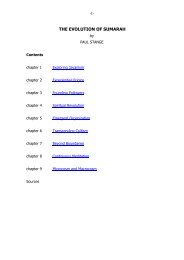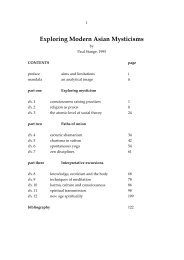Javanese Mystical and Marxist Dialectics - Paul Stange
Javanese Mystical and Marxist Dialectics - Paul Stange
Javanese Mystical and Marxist Dialectics - Paul Stange
You also want an ePaper? Increase the reach of your titles
YUMPU automatically turns print PDFs into web optimized ePapers that Google loves.
to socio-economic change. 14 The key to success then lies in the cadres' capacity totranslate their general ideology into terms having meaning in the village context.Ultimately, the aim is to convince peasants that they have the power to transformtheir environment if they organize <strong>and</strong> present a united front to their oppressors.Ideology <strong>and</strong> organization then emerge as fundamental principles of power.Others have concluded, <strong>and</strong> my own work confirms, that the Aidit PKI leaders werethoroughly familiar with this international communist tradition. The general level ofideological rigor far exceeded that of the 1920s <strong>and</strong> Tan Malaka. The leadershiptightly controlled access to all communist literature, but strongly encouraged thereading of the “classics” <strong>and</strong> broadened awareness through extensive cadre training<strong>and</strong> the establishment of a People's University in 1958. 15 Mao <strong>and</strong> Lenin were themost frequently translated, but many others were accessible. 16 Aidit <strong>and</strong> Lukman,another major leader of the PKI, spent eighteen months in China <strong>and</strong> Vietnam justbefore rising to the head of the PKI, but as youthful representatives of a recentlydevastated party they received little attention. 17 At any rate, familiarity with thosemovements does less to explain subsequent similarities than parallels between them<strong>and</strong> the centrality of the peasant question in each case. Aidit continually stressed theneed for creative rather than dogmatic application of <strong>Marxist</strong>-Leninist theory -although parallels with China <strong>and</strong> Mao are clear, the over-all PKI strategy of a unitedfront from above was independent. 18 He affirmed thatin the struggle to create a united national front, both by cooperation withvarious political parties or by cooperation with peoples of various trends <strong>and</strong>ideologies, the Party must not become merged with them - the Party mustpreserve its political, ideological, <strong>and</strong> organizational independence. 19At least on the surface, the Aidit PKI was neither a mindless mimic nor careless agentof <strong>Marxist</strong> theory - rather it seemed to be a creative, independent, <strong>and</strong> responsibleParty. In the face of tight restrictions, the triumvirate of Aidit, Lukman, <strong>and</strong> Njototransformed the PKI from a shattered remnant into the best disciplined <strong>and</strong> mostpowerful of Indonesia's parties.The new leadership concluded very early that the only viable route to power lay inacquisition of massive popular support. At the same time, geo-politicalcircumstances prevented consideration of an aggressive Yenan strategy. As Hindleysummarizes it




